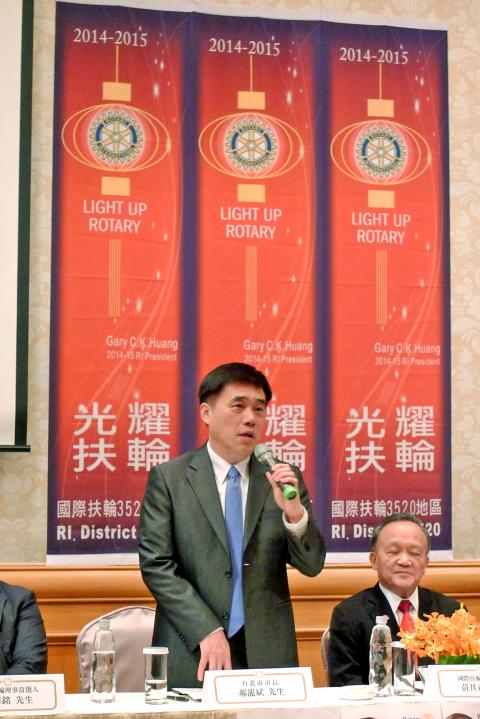Taipei Mayor Hau Lung-bin’s (郝龍斌) comments about Taiwan being “abandoned by its motherland” have prompted criticism from politicians across party lines, who said the comments came across as inappropriate.
Hau met with China’s Taiwan Affairs Office Minister Zhang Zhijun (張志軍) in Beijing on Sunday.
In response to media queries on his views about cross-strait contentions, Hau said: “Taiwan had been abandoned by its motherland” and it felt hurt and wanted emotional distance.

Photo: Yu Pei-ju, Taipei Times
Hau, known for supporting the idea that both sides of the Taiwan Strait belong to the Zhonghua minzu (Chinese ethnic group, 中華民族), added that the nation’s 23 million people have a consensus that they belong to the Republic of China (ROC) and that both sides of the Taiwan Strait should learn to view things from different perspectives.
Chinese Nationalist Party (KMT) Legislator Lo Shu-lei (羅淑蕾) said Hau must have been referring to the Treaty of Shimonoseki, but was confused.
The treaty ended the First Sino-Japanese War between the Qing Dynasty and the Japanese empire and ceded Taiwan to Japan.
The treaty was signed on April 17, 1895, and entered into force on May 8, 1895.
Lo said that when the treaty was signed, Qing official Lee Hongzhang (李鴻章) told Chinese Empress Dowager Cixi (慈禧太后) that Taiwan was a “backward territory where flowers do not bloom, the birds do not sing, the men are heartless and the women without love.”
“The Qing Dynasty is not our motherland. We overthrew the Qing Dynasty. Taiwan is an independent nation and no longer has feelings of being abandoned,” Lo said.
Taipei City Councilor Hsu Chia-ching (徐佳青) of the Democratic Progressive Party criticized Hau’s “slanted historical views.”
When asked for a comment, KMT Taipei City mayoral candidate Sean Lien (連勝文), said everyone in the ROC has their own thoughts on China, but did not elaborate further.
New Taipei City Mayor Eric Chu (朱立倫) said he hoped people would not judge things purely from an ideological perspective, adding that there were many things over the course of 400 years of history to reconsider.
Both sides of the Strait need to face up to the bad blood between them with seriousness and should consider the factors that could explain why Taiwanese regard China and its people with such hostility, he added.
Meanwhile, Hau yesterday said that he was speaking of historical facts from more than a century ago.
He said that the “motherland” refers to the ROC, adding that his comments were made in private and had been blown out of proportion.
The ROC was founded on Jan. 1, 1912 — 17 years after the Treaty of Shimonoseki was signed.
Hau met with Zhang as he wrapped up a four-day trip to Beijing, his first official visit to the city. He was there to take part in a travel exhibition.

ACTION PLAN: Taiwan would expand procurement from the US and encourage more companies to invest in the US to deepen bilateral cooperation, Lai said The government would not impose reciprocal tariffs in retaliation against US levies, President William Lai (賴清德) said yesterday, as he announced five strategies to address the issue, including pledging to increase Taiwanese companies’ investments in the US. Lai has in the past few days met with administrative and national security officials, as well as representatives from various industries, to explore countermeasures after US President Donald Trump on Wednesday last week announced a 32 percent duty on Taiwanese imports. In a video released yesterday evening, Lai said that Taiwan would not retaliate against the US with higher tariffs and Taiwanese companies’ commitments to

‘SPECIAL CHANNEL’: Taipei’s most important tasks are to stabilize industries affected by Trump’s trade tariffs and keep negotiations with Washington open, a source said National Security Council Secretary-General Joseph Wu (吳釗燮) arrived in the US for talks with US President Donald Trump’s administration, a source familiar with the matter said on Friday. Wu was leading a delegation for a meeting known as the “special channel,” the Financial Times reported earlier. It marked Trump’s first use of the channel since returning to the White House on Jan. 20. Citing a source familiar with the matter, the Financial Times reported that Minister of Foreign Affairs Lin Chia-lung (林佳龍) was also a part of the delegation. The visit came days after China concluded war games around Taiwan and amid Trump’s

Intelligence agents have recorded 510,000 instances of “controversial information” being spread online by the Chinese Communist Party (CCP) so far this year, the National Security Bureau (NSB) said in a report yesterday, as it warned of artificial intelligence (AI) being employed to generate destabilizing misinformation. The bureau submitted a written report to the Legislative Yuan in preparation for National Security Bureau Director-General Tsai Ming-yen’s (蔡明彥) appearance before the Foreign Affairs and National Defense Committee today. The CCP has been using cognitive warfare to divide Taiwanese society by commenting on controversial issues such as Taiwan Semiconductor Manufacturing Co’s (TSMC, 台積電) investments in the

HELPING HAND: The steering committee of the National Stabilization Fund is expected to hold a meeting to discuss how and when to utilize the fund to help buffer the sell-off The TAIEX plunged 2,065.87 points, or 9.7 percent, to close at 19,232.35 yesterday, the highest single-day percentage loss on record, as investors braced for US President Donald Trump’s tariffs after an extended holiday weekend. Amid the pessimistic atmosphere, 945 listed companies led by large-cap stocks — including Taiwan Semiconductor Manufacturing Co (TSMC, 台積電), Hon Hai Precision Industry Co (鴻海精密) and Largan Precision Co (大立光) — fell by the daily maximum of 10 percent at the close, Taiwan Stock Exchange data showed. The number of listed companies ending limit-down set a new record, the exchange said. The TAIEX plunged by daily maxiumu in just